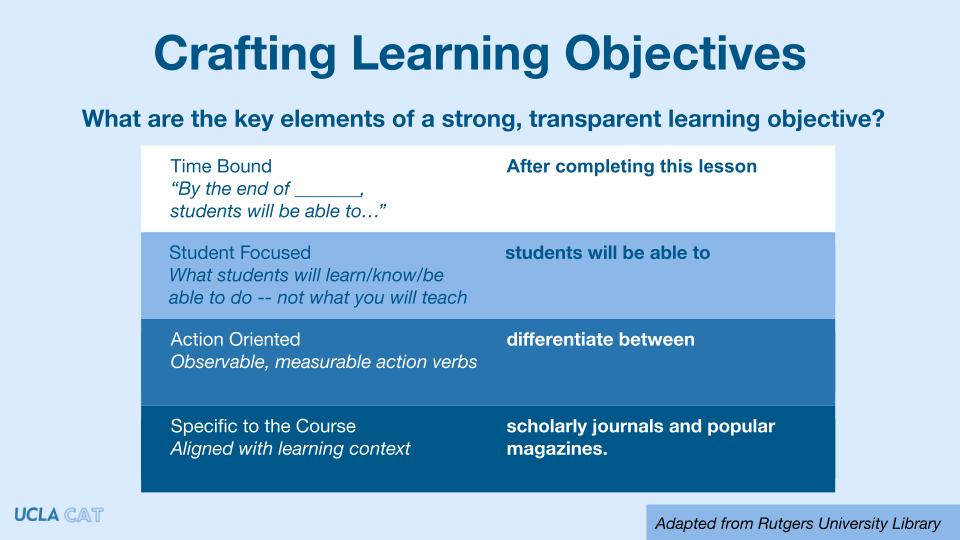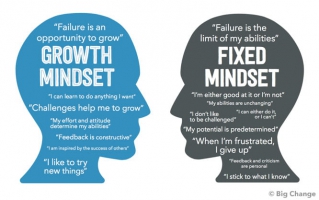Update an Existing Syllabus or Course Plan
Use the self-assessment guides and syllabus rubrics below to evaluate and revise your course plan.


Welcome! At this site, you will find information to help you apply evidence-based teaching practices to create or revise course plans with an eye toward 1) fostering equitable and effective learning for your students and 2) building your capacity (and that of your instructional team) to design flexible activities and assessments suitable for any teaching modality. For help using these resources, contact us at consult@teaching.ucla.edu.
Click on the tabs at the top of the page to explore the following sections:
There are many evidence-based frameworks for course design. The approaches linked below share an emphasis on student-centered learning and inclusive teaching practices Research demonstrates that these approaches help improve academic performance and foster a more equitable learning environment. Click on the bolded hyperlinks below to explore key resources that introduce each of these approaches in more detail.
Contact TLC to schedule a one-on-one consultation to identify the course design approaches that will be most authentic and meaningful for your specific discipline and teaching context–or join us for one of our course design workshops!
Explore the video gallery below to hear UCLA faculty reflect on their experiences designing (and redesigning) courses to improve learning outcomes and enhance equity. A short bibliography below the video gallery cites just a few of the many research studies documenting how committing to transparent, equity-minded course design benefits both students and instructors. Several of these studies were authored right here at UCLA!
Michelle Liu Carriger (Theater, School of Theater, Film, and Television) – “Accessibility by Design, not by Exception” (starts at 25:20)
H. Samy Alim (Anthropology & African American Studies) – “Culturally Sustaining Pedagogies”
Faculty Panel: Equity-Centered Course Transformations (Life Sciences & CEILS Out of the Box initiative)
Check out recordings from the Creating Connections annual conference, hosted by students completing UCLA’s Graduate Certificate in Writing Pedagogy. To learn more about opportunities for UCLA graduate students to design and teach their own courses, visit this page of the TLC website.
Below, you will find just a small sample of studies authored by UCLA researchers related to course design and student learning outcomes.
Explore the course design tools below for assistance developing a syllabus or course plan from scratch, and for help updating an existing course.
Use the self-assessment guides and syllabus rubrics below to evaluate and revise your course plan.
Use the templates below to help you create a new syllabus from scratch or update an existing course.
Looking for a step-by-step course design tool? Try UCSD’s Course Mapping Guide!
Academic Integrity
UCLA is a community of scholars. In this community, all members including faculty, staff and students alike are responsible for maintaining standards of academic honesty. As a student and member of the University community, you are here to get an education and are, therefore, expected to demonstrate integrity in your academic endeavors. You are evaluated on your own merits. Cheating, plagiarism, collaborative work, multiple submissions without the permission of the professor, or other kinds of academic dishonesty are considered unacceptable behavior and will result in formal disciplinary proceedings usually resulting in suspension or dismissal.
Additional information can be found on the website for the Office of the Dean of Students: https://deanofstudents.ucla.edu/student-conduct-code
Remember: There are many alternatives to academic dishonesty!
Looking for additional information for instructors from the Dean of Students office? Check out the following:
Suggested syllabus insert (a longer version of the text above)
Accessibility & Accommodations
Suggested syllabus text from UCLA’s Center for Accessible Education:
If you are already registered with the Center for Accessible Education (CAE), please request your Letter of Accommodation in the Student Portal. If you are seeking registration with the CAE, please submit your request for accommodations via the CAE website. Students with disabilities requiring academic accommodations should submit their request for accommodations as soon as possible, as it may take up to two weeks to review the request. For more information, please visit the CAE website (www.cae.ucla.edu), visit the CAE at A255 Murphy Hall, or contact us by phone at (310) 825-1501.
NOTE: Some instructors choose to incorporate accessibility into a broader statement framed through the lens of equity and inclusion. See below for an example. However, if you choose to modify the language above, please be sure to name the Center for Accessible Education and provide information about how students can reach out for support.
Equity, Diversity, Inclusion, and Belonging
I, as your instructor, value equity, diversity, and inclusion (EDI). I view the diversity that students bring to this class as a strength, benefit, and resource. I have tried to present materials and activities that reflect this goal. Some examples of diversity I have in mind are religion, nationality, gender identity, sexuality, disability, age, socioeconomic status, race, ethnicity, and their intersections. I hope that you will communicate with me or your TA if you experience anything in this course that does not support an inclusive environment, and you can also report any incidents you may witness or experience on campus to the Office of Equity, Diversity, and Inclusion on their website.
Looking for help developing community agreements for your course? Check out this guide developed by TLC and UCLA Intergroup Dialogue!
Land Acknowledgment
As a land grant institution, UCLA acknowledges our presence on the traditional, ancestral and unceded territory of the Gabrielino/Tongva peoples. Visit this website for up-to-date land acknowledgment text to include in your syllabus.
We invite you to learn more about the Gabrielino/Tongva peoples, about land acknowledgment, and about additional actions that can support the ongoing work of decolonizing relationships with people and place using the links below. This resource list is not exhaustive.
Guide to Indigenous Land Acknowledgment and Going Beyond Land Acknowledgment (Native Governance Center)
Supportive Services for Students
UCLA provides many resources to support students facing challenges, whether inside or outside the classroom. UCLA’s Student Affairs Guidebook gathers key resources for graduate and undergraduate students: https://www.studentaffairs.ucla.edu/guidebook. Students can always consult the Student Care Managers program website for information about supportive services, including information about confidential one-on-one consultation: http://www.studentincrisis.ucla.edu/Who-can-Help. If you need to request an academic accommodation based on a documented disability affecting your work in this course, please contact the Center for Accessible Education as soon as possible. You can learn more about CAE services by exploring their website at http://www.cae.ucla.edu.
COVID-19 Protocols
Ensuring a safer campus depends on each of us following the latest UCLA health and safety guidelines. While campus policies must be modified to address changing local, state, and national orders and guidance, the most current information is available at covid-19.ucla.edu. For sample text instructors can paste into course syllabi, click here.
Protecting Privacy & Data During Remote Working & Using Zoom
Visit this website from the UCLA Administrative Vice Chancellor’s Office for the most up-to-date information about privacy policies.
A learning objective is a specific, measurable action that a learner is able to do after receiving instruction. For example:
By the end of this tutorial, you will be able to:
1) define what a learning objective is and why it is important; and
2) write your own learning objectives using strong, observable action verbs.
The infographic below describes the key elements of strong, transparent learning objectives.

Clearly articulating course-level learning objectives in a course syllabus–and linking those broad goals with objectives for individual assignments and lessons–helps students align their performance with course expectations and provides a structure that makes it easier for instructors to offer feedback targeted toward student growth. In the video below, UCLA Physics & Astronomy professor Joshua Samani reflects on what makes strong, transparent learning objectives “The Most Powerful Tool for Instructional Design.”
As you work to develop or revise learning objectives for your course, you may find it helpful to explore some of the many evidence-based frameworks for aligning course objectives with different levels of learning and dimensions of human development, including Bloom’s Taxonomy and Fink’s Taxonomy. It may also be helpful to review this chart from the University of Arkansas, which suggests action verbs appropriate for different levels and dimensions of learning. Additional resources can be found below.
We assess student learning in order to determine the extent to which students are developing the desired knowledge and skills for a particular course or lesson, and–by extension–whether our instruction is effective in supporting student learning. Assessment can take the form of high-stakes assignments (such as midterm and final exams or term papers and projects) as well as low-stakes activities (such as quizzes, minute papers, or in-class discussions and presentations). Any class assignment, whether graded or ungraded, can serve as a form of assessment as long as it provides an opportunity for students to demonstrate their learning and receive feedback on how well their performance aligns with objectives.
Below, you will find featured resources from UCLA to support you in designing and implementing learning assessments for your courses, followed by a list of supplemental resources from other institutions recommended by TLC staff. Contact TLC to schedule a one-on-one consultation to identify the assessment approaches that will be most authentic and meaningful for your specific discipline and teaching context–or join us for one of our workshops!
Click to explore key considerations for equity, effectiveness, managing grading load, and more.
Click to explore strategies for integrating writing and research in courses across the disciplines.
Click to explore quick and practical research and writing tutorials, collaboratively designed by students at UCLA.
Click to explore assessment strategies and equitable grading practices (STEM focus but relevant to all instructors).
Click to explore UCLA’s campus-wide framework for assessing learning at three levels: student, course, and program.
Click to explore how UCLA approaches gathering “evidence of student learning” for WASC accreditation.
Designing Effective Multimedia and Multimodal Assignments (TLC & Writing Programs) – view additional resources
Incorporating Research & Project-Based Learning in Undergraduate Courses (TLC & URC-HASS) – view additional resources
Teaching through Collaborative Research Projects (TLC & URC-HASS) – view additional resources
Teaching with Archives & Museums (TLC & URC-HASS) – view additional resources
Equity-Centered Course Transformations (Life Sciences & CEILS Out of the Box initiative)
Click to explore UCSD’s interactive tool for aligning assessments with learning objectives and activities.
Click to explore Vanderbilt University’s guide to assessing student learning.
Click to explore Carnegie Mellon University’s guide to assessing student learning.
A growing body of research demonstrates that participating in active and collaborative learning increases student engagement and improves course effectiveness and outcomes for all learners. Research also shows that such practices often improve retention, narrow achievement gaps for historically marginalized student populations, and help create learning environments that are more inclusive and accessible for all students.
This section of our website gathers key resources from TLC and our campus partners as well as peer institutions to help you foster student engagement in ways that are authentic and meaningful for your specific discipline and teaching context. A short bibliography at the bottom of the page provides more information about research studies documenting the benefits of active and collaborative learning.
Click to view the recording and resources from this webinar focused on technology-enhanced instruction and remote teaching.
Click to view this resource website from CEILS, including videos of active learning techniques in action.
Click to view this guide that introduces the pedagogy behind polling and compares popular polling tools.
Click to learn more about teaching with discussion forums, Slack, Campuswire, and more.
Click to explore this self-paced module on active learning from Queen’s University.
Click to explore this guide from Carnegie Mellon University about developing, managing, and assessing group projects.
Click to explore this resource guide from Pedagogy in Action based at Carleton College.
Click to explore this resource guide from Louisiana State University featuring active learning strategies suitable for all modalities of instruction.
Explore the resources below to learn about strategies for effectively working with Teaching Assistants (TAs) to help improve student learning in your classes while also fostering the professional growth and development of your graduate student TAs.
Click to view/download a guide to developing shared expectations among members of your teaching team.
Click to view/download a checklist for fostering effective communication among members of your teaching team.
Click to view the recording and resources from this webinar.
Click to view the recording and resources from this webinar.
Click to visit CAT’s Graduate Programs website.
Click to visit a website dedicated to gathering campus-wide opportunities for graduate students and post-doctoral scholars to further their teaching and learning scholarship.
Click to learn more about CIRTL@UCLA and the Center for the Integration of Research, Teaching, and Learning (CIRTL), a nation-wide online network of 40+ universities that seek to enhance excellence in teaching and learning.
 Numerous research studies document the crucial role that feedback plays in fostering a growth mindset, as well as motivating long-term learning gains for students and professional growth for instructors. Explore the resources below to learn more about giving feedback on student work and structuring student peer review and self-reflection activities, and about approaches to gathering and using feedback from students and peers about your teaching.
Numerous research studies document the crucial role that feedback plays in fostering a growth mindset, as well as motivating long-term learning gains for students and professional growth for instructors. Explore the resources below to learn more about giving feedback on student work and structuring student peer review and self-reflection activities, and about approaches to gathering and using feedback from students and peers about your teaching.
